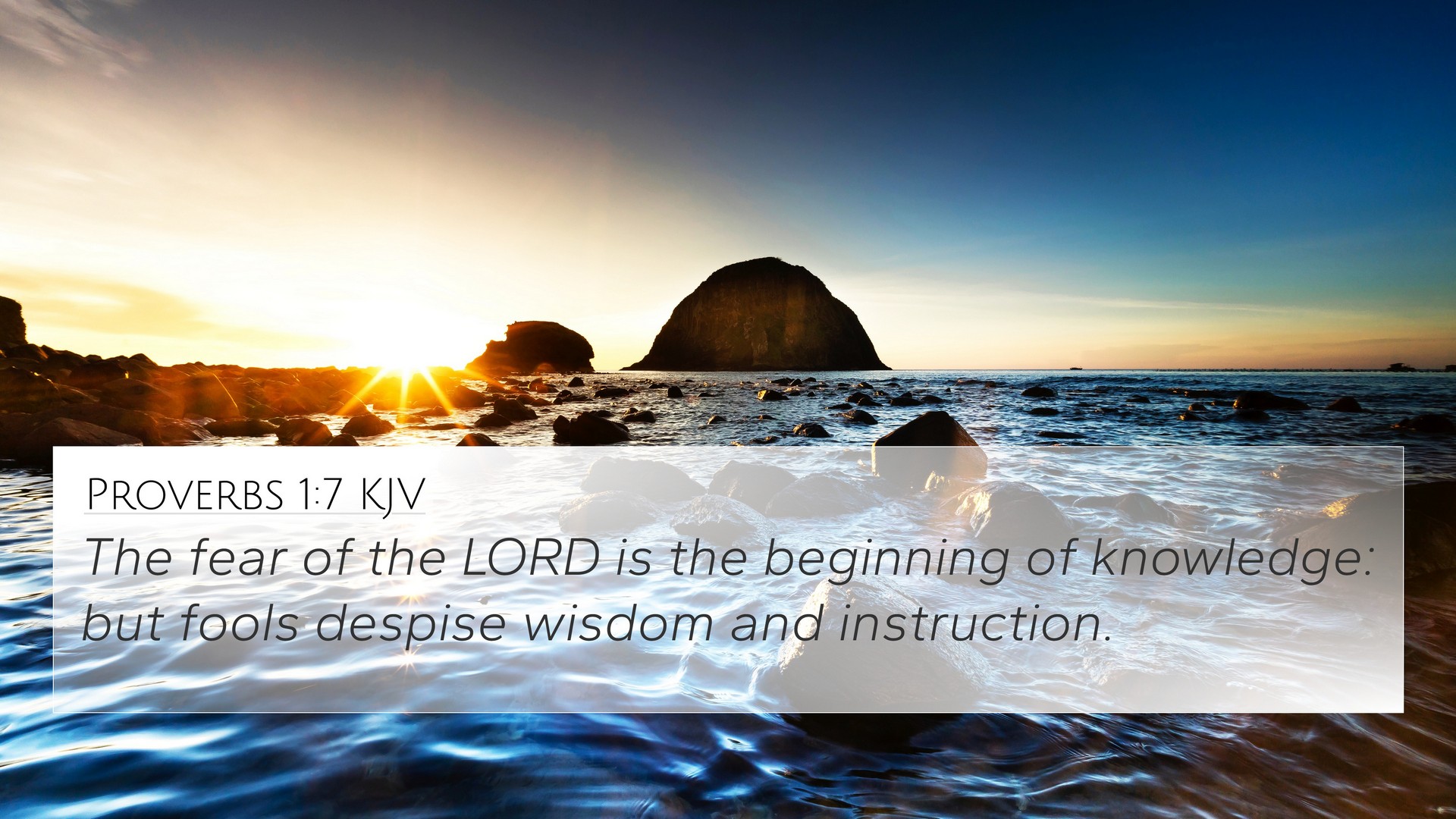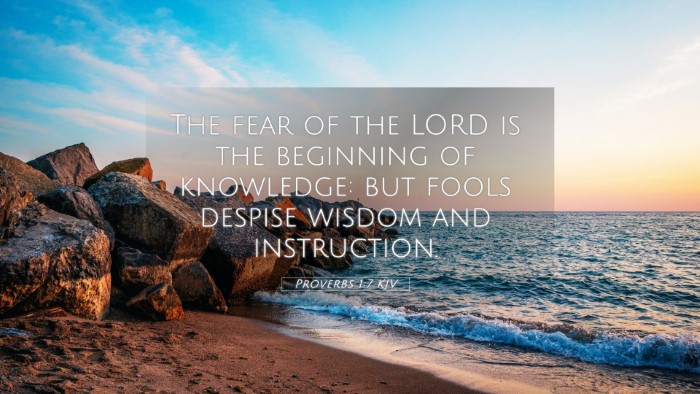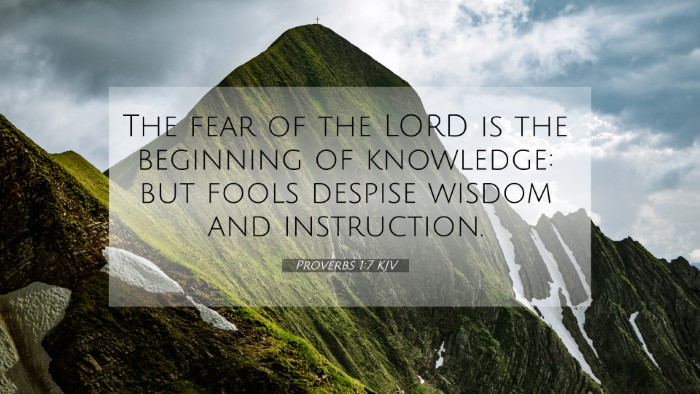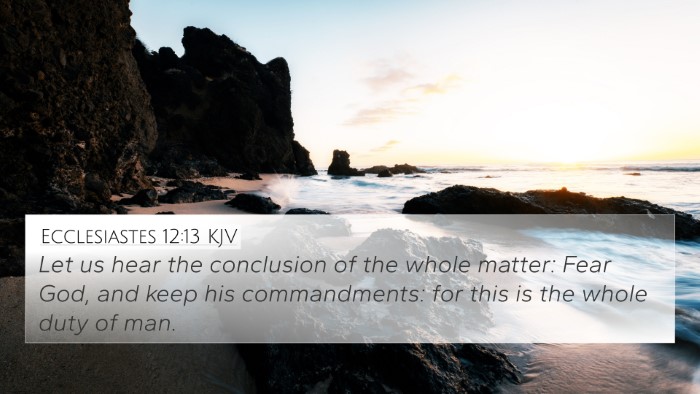Understanding Proverbs 1:7
Proverbs 1:7 (KJV): "The fear of the Lord is the beginning of knowledge: but fools despise wisdom and instruction."
Meaning and Interpretation
This verse from Proverbs encapsulates a central theme in biblical wisdom literature—the critical importance of reverence for God as the foundation of true knowledge.
- Fear of the Lord: The term "fear" here denotes a deep respect and awe for God, recognizing His majesty and authority. This is not a fear that drives one away from God, but a reverential fear that draws one closer.
- Beginning of Knowledge: Knowledge in this context refers not just to information, but to wisdom, understanding, and the right application of truth. This knowledge begins with acknowledging God as the ultimate source of wisdom.
- Fools and Instruction: The contrast made between the "wise" who fear the Lord and the "fools" who despise wisdom highlights the moral and spiritual dimensions of knowledge. Fools refuse to recognize God’s truths and hence miss out on true wisdom.
Public Domain Commentary Insights
Matthew Henry's Commentary: Matthew Henry emphasizes that true wisdom and knowledge begin when one appropriately fears God. He suggests that the fear of the Lord is essential to understanding life’s complexities and that it forms the bedrock of all other knowledge. Ignoring this fear leads to foolishness.
Albert Barnes' Notes: Barnes interprets this verse as showing that the fear of the Lord is the foundation upon which all learning is built. He points out that real wisdom is intertwined with a relationship with God, and thus, those who disregard this relationship inevitably become foolish.
Adam Clarke's Commentary: Clarke adds that the verse can be understood as addressing the necessity of divine revelation in acquiring knowledge. He notes that without recognizing God's authority, human wisdom is limited and flawed. Clarke asserts that the precept stands as a universal truth applicable to all aspects of life.
Cross-References and Thematic Connections
Proverbs 1:7 can be cross-referenced with several other biblical passages that collectively reinforce its meaning:
- Job 28:28: “And unto man he said, Behold, the fear of the Lord, that is wisdom; and to depart from evil is understanding.”
- Psalms 111:10: “The fear of the Lord is the beginning of wisdom: a good understanding have all they that do his commandments: his praise endureth forever.”
- Ecclesiastes 12:13: “Let us hear the conclusion of the whole matter: Fear God, and keep his commandments: for this is the whole duty of man.”
- Isaiah 33:6: “And wisdom and knowledge shall be the stability of thy times, and strength of salvation: the fear of the Lord is his treasure.”
- Proverbs 9:10: “The fear of the Lord is the beginning of wisdom: and the knowledge of the holy is understanding.”
- Proverbs 15:33: “The fear of the Lord is the instruction of wisdom; and before honour is humility.”
- 1 John 5:20: “And we know that the Son of God is come, and hath given us an understanding, that we may know him that is true, and we are in him that is true, even in his Son Jesus Christ. This is the true God, and eternal life.”
Application of Proverbs 1:7
Utilizing this verse as a guiding principle, believers are encouraged to cultivate a lifestyle marked by reverence for God. This foundation leads to:
- Seeking to understand Scripture through the lens of the fear of God.
- Striving to apply wisdom in daily decisions based on godly principles.
- Promoting humility and an eagerness to learn from God and His Word.
- Encouraging others to value wisdom and instruction as guided by divine truth.
Conclusion
In conclusion, Proverbs 1:7 highlights the essential relationship between the fear of the Lord and the acquisition of true knowledge. It serves as a fundamental reminder of the need for humility, reverence, and a willingness to learn from God’s wisdom. By cross-referencing with other biblical texts, one can see this theme of divine knowledge woven throughout Scripture, establishing a framework for understanding the greater narrative of God’s relationship with humanity.
Further Study Tools
For those interested in further exploring the connections between Bible verses and themes, consider utilizing:
- Bible Concordance: A useful tool for finding scripture references.
- Bible Cross-Reference Guide: Helps identify related verses.
- Cross-Reference Bible Study: An approach for in-depth scriptural exploration.
- Bible Reference Resources: Various tools available for enhanced study techniques.














